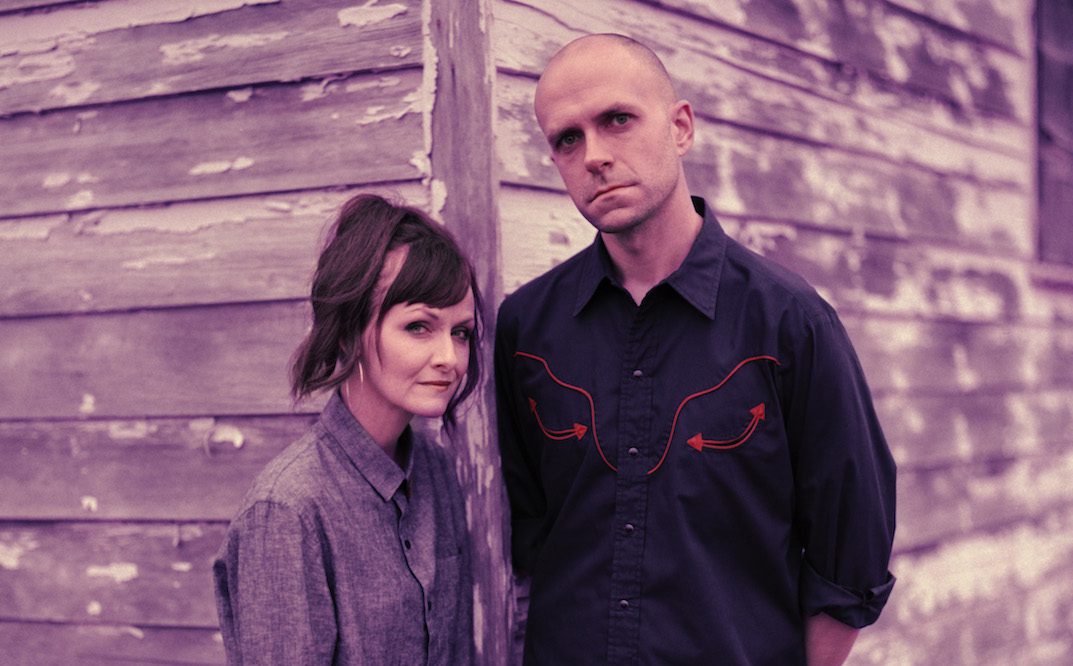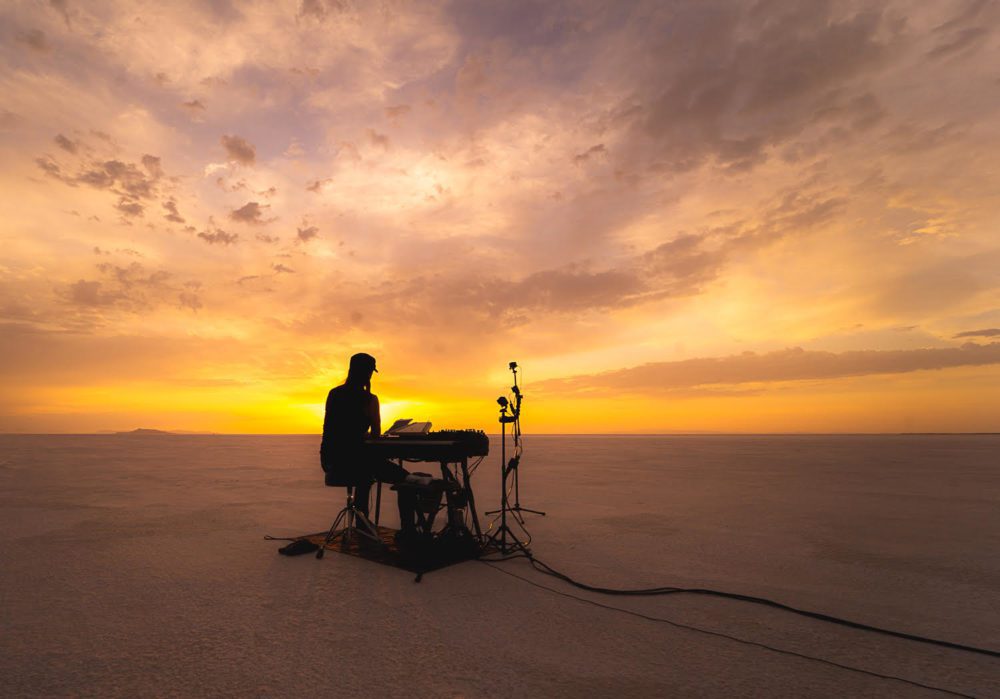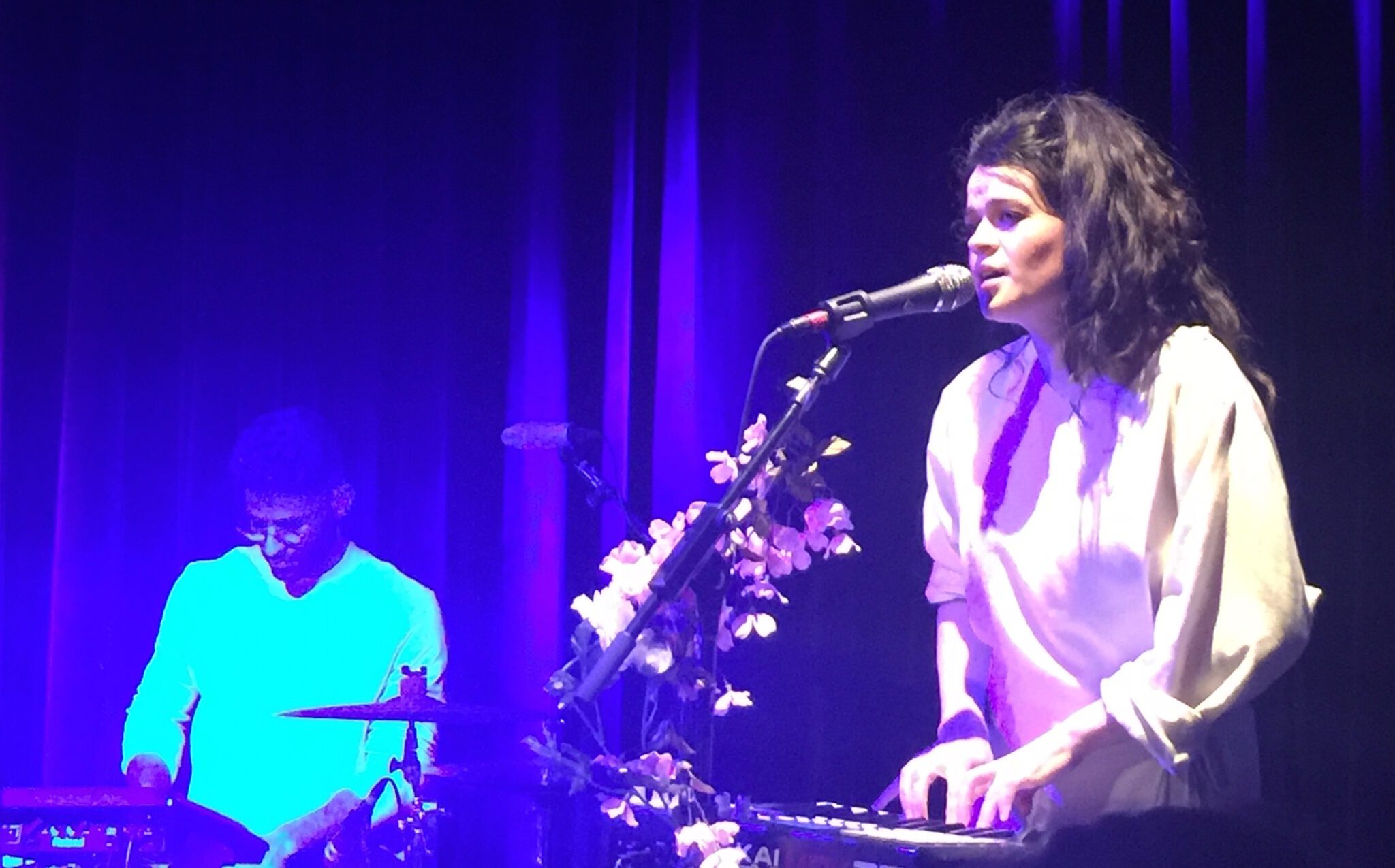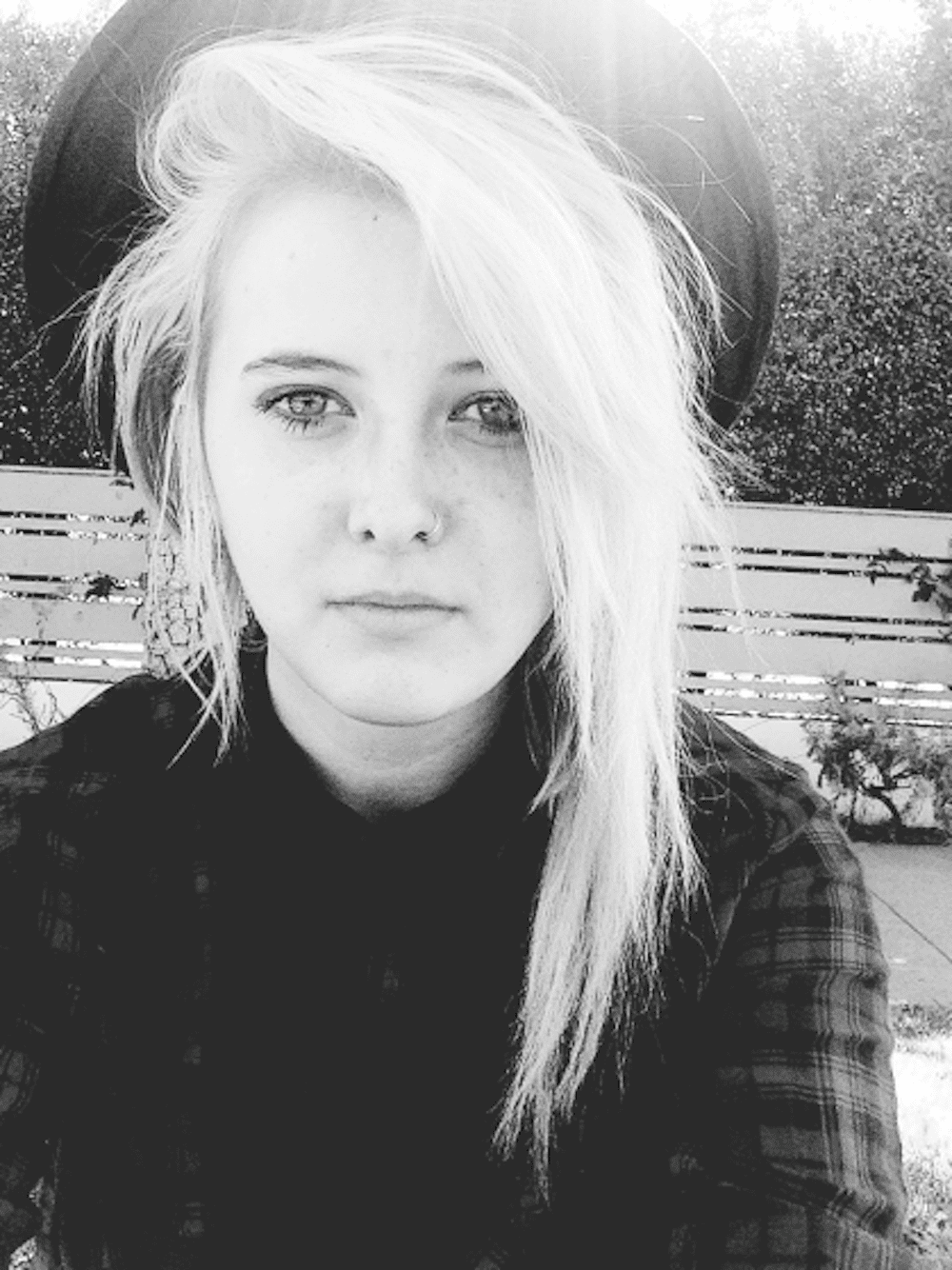

Survivors of abuse are too often portrayed as victims: quiet, sullen, spoken for. But Nashville-based melodic metal duo Friendship Commanders seeks to rewrite that narrative with their latest EP Hold On To Yourself, in which the band confronts abuse, abusers, and familial complacency with the timidity of a razor blade.
Buick Audra’s voice will make even the most metal-adverse listener into a fan. Her powerful vocals battle against drummer Jerry Roe’s relentless hammer of a drumbeat from the opening wail of “The Enemy I Know.” The song is a crack in a doorway, letting the listener into a private conversation between the female voice and an elderly relative; as memories of the event in question are broken down, the recurring mantra “I’m not your enemy” morphs from a plea for truth to statement of fact.
The band is as unrelenting live as they are recorded. The tension between Audra’s words and Roe’s actions translate beautifully throughout Hold On To Yourself; on songs like “Among Monsters,” the music winds to a point of no release, building to the moment Audra asks the listener “Can you imagine a world where you feel okay?” It’s a question without an answer for those who have survived abuse, only to carry the scars physically and mentally.
While the EP often plays with the balance of vulnerable lyrics and aggressive sounds, some songs are an all-out confrontation. On “Anywhere (From The Nameless Bride)” Audra challenges a male character with the repeated question “How’s your ego doing?” That Audra’s voice is so strong, resilient, insistent on expressing power is a statement in and of itself; the real world, where women are too often spoken down to and degraded, begins to seem like a bad dream in the wake of its force. “Tuxedo Means Wolf (Redux)” carries on the feeling of a mantra, a chant, a sacred formula for healing; it gives the listener an outlet for their rage, a steady stream to jump into and cool off. “July’s Revelations” finishes the EP with a clear, sweet message of self-love and self-possession: “I don’t want to hold your feet to the fire / I just want to hold on to myself.”
“Our culture tends to diminish survivors’ voices instead of amplifying them,” Audra said in a statement about the band’s work. “But I want to be loud about it. Survival isn’t neat. Neither is being abandoned or gaslighted about what happened. Truth is not the enemy. It’s just truth.”
Listen to AudioFemme’s exclusive stream of Hold On To Yourself and read our interview with Friendship Commanders below.
AF: Your new EP Hold On To Yourself continues Friendship Commanders’ important work of holding space for survivors of abuse. The first track on the album, “The Enemy I Know,” feels so real in its plea for the truth, and its pain in wanting to communicate with the abuser. When you go about writing a song like this, how does it begin? Does a lyric come to mind, or do you play more with a scene or conversation?
BA: I wrote this song, and the first thing I knew about it was the refrain of “I’m not your enemy!” That phrase had been coming up around all kinds of interactions in my personal and public lives. It was the clearest statement I could make when I felt like someone was trying to see me as The Problem. And I want to add that my experience with being an abuse survivor also comes with some communication issues with other members of the story. A lot of people just want things to be easy, and sometimes easy translates to untrue. That’s an additionally painful reality for me, and I’m sure for others. I did write this song in response to a real conversation with a family member who absolutely can’t see me as I am. They have a different lens and there’s nothing I can do about it.
The first part of the song I wrote musically was the riff in the verse, played with octaves on guitar, and I worked the vocal melody out along with it as I went. The chorus came next, and I had what I can only describe as a kind of euphoric response to the chord progression there. It’s not terribly complicated, but it’s also not necessarily common or what you’d expect—I didn’t even expect it. Top to bottom, I think the song took about an hour to write. And I took it to Jerry, who then added what he does to it, and there it was. It was immediately the heaviest song we’d ever played together, musically and lyrically.
I will say this: yelling “I’m not your enemy!” over and over is incredibly cathartic for me. I love to play it live. The part that nearly makes me cry every show is screaming, “I’m still alive!” Because I am, and sometimes it has to be said aloud. Even for me.
AF: As you’ve both toured with such beautifully brutal, heart-wrenching music, have you gotten feedback from other survivors who might find going to your concerts a place of power or release?
BA: Thank you for the very kind words about what we do! We have, over the years, had people give us feedback about how the work connects to them, to their lives. Not yet with “The Enemy I Know,” but with other songs from past records, yes. I’ve also written about watching someone you care about struggle (nearly to death) with addiction issues, about being a woman in scenarios where there are very few other women—and even fewer who will stand with women, and about the side effects (if you will) of being a trauma survivor. That can mean feelings of worthlessness, anger, never really belonging to anything/anyone, and a whole other pile of difficult things. These things resonate because they’re just human realities, whether we’ve all had the same experiences or not. It’s always very telling for me when someone tells me which work of ours they can’t stop listening to.
But this record, I really wanted to shout-out the people who are specifically impacted by abuse. Because the impact is lasting, and I think we need to be having more dialogue about it; making room for it.
JR: I can speak to how the music makes me, and some of my friends and the fans I’ve talked to feel. Our shows are very loud, fast and non-stop. As such, they can be really cathartic and fun. When you combine that with such meaningful and ideal-based music, I think it creates a potent stew that can make you feel quite alive. I know I feel the best I ever feel when we’re playing regularly. It’s very good for my soul. I think the audience can share in that, past however seen and heard the lyrics may make them feel.
AF: How did Friendship Commanders begin? Are you both from Nashville originally?
BA: I’m actually from Miami! And I moved to Nashville from Brooklyn 12 years ago.
JR: I am from Nashville! Born and raised, which is both rare and a very weird thing to be at this current moment in time.
BA: [The band] began as a sort of demo project/experiment. I had written some songs that were different from what I was doing in my solo work, and we decided to record them together and see what it sounded and felt like. We loved it right away, but definitely didn’t take it too seriously until we’d been doing it on and off for a while. I feel like we really became a band in 2015. And even since then, we’re remarkably different. All I can say is the world is a heavy place, and the music seems to be getting heavier in direct response to it. And I love it.
AF: What bands would you cite as influences on your work?
BA: We’re terrible at answering this question. I’m a big rock fan, and also a huge R&B fan. So, those come together for me in soulful rock projects with big vocals like Alice in Chains and Soundgarden. Big influences for me, for sure. I think one of the greatest power metal vocalists of all time is Ann Wilson of Heart. Definitely Ann and Nancy. Rush, for sure. And then like Chaka Khan and Prince. I used to listen to a lot of music that I don’t anymore, but it left its mark.
JR: I came up in a deep culture of classic American music, but my parents and other peers were very keen on what was happening at the time, so I feel like that all influences what I bring to this band. Soundgarden, King Crimson, Voivod, Fishbone… even Metallica and Megadeth were pretty formative to me growing up, but I also absorbed tons of classic country, folk, and roots rock. Elvis Costello, The Band, and a lot of the session greats like Jim Gordon and John Robinson really made me who I am.
AF: The music you make is very focused and the material is heavy, weighted with real-life import. What do you to prepare for a show and how do you unwind after a performance?
BA: So, I have terrible, terrible stage fright. I always have, and likely always will. Getting on stage at all is a whole thing for me, even though I do it all the time. I have a ritual of asking for the music to come through me and find its home with the listeners, to remove my ego from my fear. And I do lots of forward bends before we play (if you’ve ever seen us play, you know this is true), because I find it helps to stabilize my heart rate. I try not to be too social in the room before we play. I can’t really hang.
Weirdly, the gravity of the music and what it’s about is not hard for me to carry. At all. The sentiments and experiences really live in the songs now, so it’s kind of like I just put that on and wear it for 40 minutes, and then I take it off.
After the show, I try not to be too hard on myself, but I can be guilty of that. Like I said above, I struggle with my worth. Sometimes my stage fright makes me feel imperfect and I think everyone is zeroing in on that. They’re probably not, but it feels real. Plus, I’m a woman, so I feel like I’m sometimes watched differently, to see if I’m any good at all. We stay through the rest of the show, hang with people who have come out, and then we try to get quiet immediately after. The show is so physical and expressive, that we don’t even really need to talk to each other at the end of it. Self-care and self-preservation are king for us. We don’t drink or anything either. Water, showers, bed.
JR: I don’t do much to prepare, which may not be smart. I don’t warm up or have any sort of ritual practice or even watch what I eat! I just jump right in, and I’ve always been that way. Granted, I don’t front the band and I’m not baring my soul for the benefit of others in quite the same way Buick is. I feel very comfortable and at home behind the drum kit. It’s when I’m the most normal. Whatever trouble I may feel or experience is more obvious off-stage.
AF: What are your favorite Nashville music venues?
BA: We love Little Harpeth Brewing, also Exit/In, the End, Basement East. We just had tornadoes in middle Tennessee, and Basement Easy was truly wrecked, and Little Harpeth was hit, too. It’s been heavy to see these rad places for community take a hit. They’ll come back, but we grieve for time lost and pain cost in these big ordeals. Oh, also we love the High Watt!
AF: Can you recommend some local Nashville talent?
Yes, of course! Our friends in Yautja, Forest of Tygers, Howling Giant, and Slider.
AF: What do you want an audience to take away from a Friendship Commanders show?
BA: First and foremost, that we are on their side. We always want people who have a hard time feeling like they belong to know that they belong with us. We feel like that, too.
Second, I guess I want people to think about how we’re treating each other and the people around us. I think we’ve become very self-focused and it’s easy to think about the world as something that’s happening to us. But really, life is made up of countless interactions with other people, whether in person or online. Be a safe person. Try out new forms of empathy. Listen instead of talking all the time. Listen again. Hold space for people who have lived through things you have not. Try to understand. And if you have any kind of privilege, please use it to help others, not to hurt them.
Last, I want people to know that a woman wrote that heavy music. Rethink what you know about how that works, and challenge your ideas of gender roles. Don’t always credit the man or men in the room. We need to keep updating how we see things. Me too.
JR: Agree on all fronts with Buick here! I’ll add that, very specifically, I want it to be a pulverizing and bombastic blast of sound. I also want it to be fun, feel safe, and be free of any sort of masculine or macho posturing and forced showmanship. I hate it when I see that or feel it from a band I’m watching, and I never, ever want to come across that way. Everybody is welcome, and we really, really mean it.
Follow Friendship Commanders on Facebook for ongoing updates.




